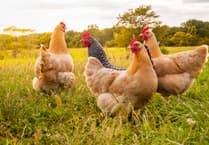The Dartmoor Farmers Association is celebrating its fifth season of supplying seasonal lambs to Morrisons.
Sourced from over 100 farms participating in the co-operative initiative across the National Park, Dartmoor lamb can now be purchased in over 56 Morrisons stores throughout the South West and London.
The DFA was formed in 2007 with the support of HM King Charles III, when he was Prince of Wales, with the aim of promoting the link between sustainable upland livestock farming, environment delivery on the open moorland landscape and the home farms themselves.
Many of the farms have common rights and play a vital role in managing the moor and conserving Dartmoor’s iconic wilderness, wildlife and biodiversity. The Dartmoor Hill Farm Project helped facilitate the formation of the group and continues to provide support and assistance where needed.
Mat Cole farms at Greenwell near Yelverton and is a director of the association. He said: 'When a customer buys our lamb, they not only make an investment in our business but they support Dartmoor’s landscape, wildlife and culture.
'We value working with Morrisons because they recognise the important relationship between farming, the environment and extensive livestock production.'
Pete Mann, also of the DFA, said: 'Farming in these uplands is challenging but delivers so many benefits. Building a sustainable future for our farms in changing times is essential key and Dartmoor Farmers is one of the keys to unlock our potential.
'Partnerships like ours with Morrisons have been a great success. They see the value in these uplands and the farms that maintain them and with more than 100 members we can access a significant quantity of lamb and beef produced to very high standards. As individuals we are very exposed to the market, but together we feel like we are now part of the conversation on price, not just price-takers.'
Many of the flocks of sheep and herds of cattle graze on the open moor and are naturalised or ‘leared’ to certain parts of the common. Developed over hundreds of years, these commoning practices in upland landscapes like Dartmoor exist in its social fabric and are a key delivery tool in maintaining the habitats which thrive within this landscape.
Most members of the association are involved in agri-environment schemes and have also signed up to a set of principles which look to reduce food miles and ensure tractability.
The group's objectives are to seek and share their skills and knowledge with future generations of farmers in order to deliver a sustainable farming future. They are also working to develop opportunities to engage with the public through on farm events and activities.
Morrisons has invested and helped association members to establish soil carbon levels and net zero targets. One significant outcome was establishing upland livestock farms as a large reservoir of carbon with the home farms averaging levels of soil organic carbon at 134.03 t/ha which is significantly above levels seen on similar pasture outside of Dartmoor.
The link between the wonderful grass-fed lamb which deliver this unique grazed biodiverse landscape, the sustainable farms and farmers which manage these flocks and herds and the thousands of visitors to Dartmoor National Park who enjoy its beauty and biodiversity is so key going forward.
With the backdrop of an Independent Review of Protected Site Management on Dartmoor, Dartmoor Farmers more than ever see collaboration as being the key tools in creating sustainable farms going forward. Livestock systems and traditional use of the common is now being challenged so it’s important we share our positive story with new audiences as well as our traditional customer base.
Sophie Throup, Technical and Sustainability Director at Morrisons said: 'As British farming’s single biggest direct customer we know how important it is to our customers that we’re able to provide them with top-quality British meat.
'That is why we’re pleased to be continuing to support the over one hundred farmers in Dartmoor to supply lamb to 56 stores across the South West and London.'





Comments
This article has no comments yet. Be the first to leave a comment.